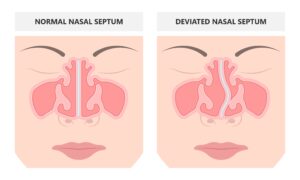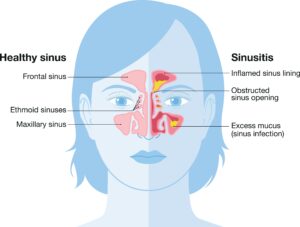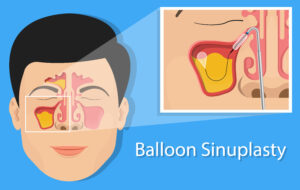
menu

Posted in Uncategorized | June 16, 2023

Does your nose often feel stuffy? Is it usually hard to breathe through your nose?
Nasal breathing problems can be due to different reasons, from allergies and a deviated septum to environmental factors and chronic sinus infections. Knowing what’s causing your breathing issues is the first important step in determining what to do about them.
Keep reading to learn more about why you may be experiencing chronic nasal breathing problems and how to start breathing better again.

An allergy occurs when your immune system overreacts to otherwise harmless substances. The substance that causes an allergic reaction is called an allergen.
Allergies are often responsible for shortness of breath. When you experience an allergic reaction, your body releases histamine, which can cause your airways to constrict.
Constricted airways limit how much air can enter and exit your lungs, decreasing your available oxygen levels. Consequently, you may have trouble breathing and feel a tightness in your chest.
Histamine can also cause inflammation of your nasal passages, which can result in congestion, making it harder to breathe.
Other common signs of an allergic reaction are:
Some of the causes of allergic reactions include:
If you suspect you have an allergy, having an allergy test can determine the substance triggering your allergies. Allergy tests may involve a skin test or blood test.
After identifying any allergens causing allergic reactions, your allergist at Specialty Care Institute may recommend avoiding triggers like pollen and pet dander. Avoiding triggers prevents exposure and reduces the risk of an allergic reaction.
Regarding medication, over-the-counter antihistamines can help block the adverse effects of histamine and relieve your allergies. These medications are most effective when taken before exposure to an allergen.
You can also combine a nasal steroid spray with antihistamines to reduce inflammation and relieve congestion, sneezing, watery eyes, and a runny nose. Decongestants can be used alongside antihistamines and nasal steroid sprays.
They narrow the blood vessels in your nasal passages to minimize inflammation and congestion. However, decongestants should only be used temporarily because long-term use can cause swelling and worsen your symptoms.
If over-the-counter medications don’t work, prescription allergy medications may be able to help. Prescription medications block or reduce your body’s immune response to an allergen and alleviate your symptoms.
Allergy shots are worth investigating for severe allergies that don’t respond to other medications. Allergy shots are given for 3 to 5 years to reduce or prevent allergy attacks.
These shots contain a small amount of allergen or allergens to train your immune system to tolerate the allergen(s) and reduce or eliminate your allergy symptoms.

The septum is the thin wall made of cartilage and bone that divides your left and right nostril. When this wall leans more toward one side than the other, it’s considered a deviated septum.
Some people are born with deviated septums, while others develop it due to nose trauma. Although uncommon, a deviated septum can also be caused by connective tissue diseases such as rheumatoid arthritis or systemic lupus.
A deviated septum can restrict air flow, making it difficult to breathe through your nose. One nostril may feel as though it’s blocked.
You may notice that this symptom worsens when you’re physically active. Other signs of a deviated septum include:
Nasal dilators, decongestants, and nasal steroid sprays only temporarily relieve the discomfort that many patients with a deviated septum face. Your ENT specialist at Specialty Care Institute may recommend surgery if you have a deviated septum causing ongoing breathing problems and other bothersome symptoms.
The surgery performed to correct a deviated septum is called septoplasty. A septoplasty is usually performed as an outpatient procedure.
During the procedure, your surgeon may remove parts of the septum and straighten your septum. A septoplasty allows you to breathe easier and drastically reduces or eliminates the symptoms of a deviated septum.

If you have an environmentally induced allergy, your immune system overreacts when you breathe in dust, dry air, or mold. An environmentally induced allergy can cause the following symptoms:
Your ENT specialist may perform an allergy test, including skin prick testing and a physical examination to determine the source of your allergies. After figuring out the root cause of your allergies, your allergist will tailor a treatment plan for you that may include the following:
A regimen of allergy shots may be started for people with more severe cases. Allergy shots build up your immune system to minimize your body’s allergic response to mold, dry air, and dust, considerably reducing or eliminating your symptoms.

Sinusitis or a sinus infection occurs when the sinuses, the hollow spaces inside your head and nose, become swollen and inflamed. Usually, healthy sinuses are filled with air.
They also have a thin lining that makes mucus. In a sinus infection, the lining is swollen, inflamed, and produces more mucus. The swelling of the lining prevents mucus from draining properly, leading to a blocked or stuffy nose.
Other signs of sinusitis include:
Over-the-counter medications are often used to treat mild sinusitis.
For more severe cases, your ENT specialist may prescribe medications to open up your nasal passages and clear up the pressure and pain.
A course of antibiotics can be enough to ease your symptoms if bacteria is what’s causing your sinus infection.

Sinusitis is typically considered chronic if your symptoms last longer than 12 weeks. Nasal congestion or difficulty breathing through your nose is a common sign of chronic sinusitis. Other symptoms include:
Antibiotics can help in the cases of some chronic sinus infections, though not all. Your ENT specialist may also prescribe nasal corticosteroids to reduce inflammation and relieve symptoms.
If chronic sinusitis doesn’t go away with standard treatments, your ENT specialist may recommend sinus surgery or balloon sinuplasty.
During sinus surgery, your ENT specialist removes obstructions in your sinus openings, like nasal polyps, mucous membrane swelling, and scar tissue. Removing these obstructions widens your sinus passageways.
Enlarged sinus passages prevent pressure buildup in your nose and decrease the severity and frequency of your sinus infections.

In balloon sinuplasty, your ENT specialist inserts a small flexible balloon catheter through your nose and into the blocked sinus passageway. They then inflate the balloon, which gently opens and restructures your sinus passages.
Next, your sinuses are drained and cleared with a saline solution. Once done, your ENT specialist will remove the balloon catheter.
Balloon sinuplasty is a highly effective procedure that restores normal sinus drainage and function. Patients usually notice improved breathing soon after their procedure.
Unlike sinus surgery, balloon sinuplasty doesn’t involve bone or tissue removal. The procedure preserves the anatomy of your sinuses.

If you have trouble breathing through your nose more often than not, it’s time to see the ENT specialists at Specialty Care Institute. Our experienced team can discover why you’re having difficulty breathing and provide an effective treatment plan to offer long-term relief.
Is it hard to breathe through your nose? Schedule your appointment today at Specialty Care Institute in Arlington Heights, Barrington, Elgin, or Hoffman Estates, IL, to start your journey to easier breathing.